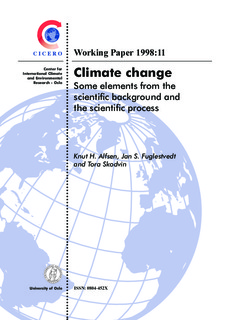| dc.description.abstract | Concluding remarks: On the nature of the climate problem
The problem of climate change is not, despite popular conception, mainly a problem of increased global average temperature. The seriousness of the problem is more related to the potential variability and instability of the global climate and the local weather. We now know that the climate system in the past has shown great and rapid fluctuations for ‘natural’ causes.
The stable climate regime observed after the last ice age is currently perturbed by the large outpouring of greenhouse gases due to human activities of many kinds. The question then is whether the stability of the current climate regime is able to withstand this kind of disturbance. The answer to this we really do not know at present. Furthermore, if the climate system should change to a more unstable regime, it is very difficult to predict the local and even regional consequences with any precision. Thus, the problem of climate change is riddled with uncertainties, and the main challenge for us in this situation is to devise a rational response to this uncertainty.
Certainly we should be willing to pay some form of insurance premium in order to reduce the risk of damaging climate change, but how high a premium? And how much of the premium should be in the form of greenhouse gas emission reductions and how much in the form of investments in better defence against a more unstable climate?
IPCC’s work is important in allowing us to get a best possible scientific foundation for answering these questions. However, providing an academic answer is one thing, to get a politically feasible answer is another. The merging of the scientific consensus and the political realities is therefore necessary, and the processes in the plenary sessions of IPCC are therefore important steps in the direction of providing practical answers to the challenge of climate change. | nb_NO |
